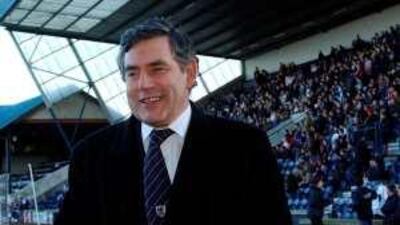"Sport has the power to change the world, the power to inspire, the power to unite people in a way that little else can ... sport can create hope ... it is an instrument for peace." Nelson Mandela. With the phoney war that traditionally precedes any British General Election well and truly engaged, it comes as no surprise that David Cameron, the Conservative leader, has turned to sport as a potential vote winner. Although raised on the playing fields of Eton where rugby union and cricket are the most popular activities, the Tory toff has been striving to present himself as an ordinary working bloke whose favourite sporting pastime is darts.
"I was switching on the Christmas lights in my Oxfordshire constituency one year," he revealed, "and they clearly felt - quite rightly - that a member of Parliament wasn't important enough to do it alone. So they invited former darts world champions John Lowe, Eric Bristow and Keith Deller along to help me. I was a bit star-struck." It is a true devotion, claim his Shadow Cabinet colleagues, who point to the dart board (a gift from Deller) in Cameron's office in the House of Commons as proof of his devotion to the arrows, even though he "does not pretend to be any good". Cor blimey, Dave, next you would have us believe that when not taking aim on the oche you don a flat cap and make your way out to Walthamstow for a night's greyhound racing.
Pardon my cynicism, but is the dart-loving Cameron not the same politician who plans to give MPs a free vote to repeal the fox hunting ban? "I have always believed that country sports are something that have taken place for years and they do not need the approach of the criminal law. In a new Parliament, it should have a new vote, on a free vote basis, on the issue of hunting," he says. The wannabe Prime Minister, who has said he would vote to scrap the ban on fox-hunting which he describes as "a farce" should he come into power, adds: "I don't see anything wrong with hunting. I was brought up in the country, I enjoy country sports, I still have a bit of time for the odd pigeon. And sometimes do a bit of fishing." Hunting, shooting, fishing, now that sounds more like the David Cameron we know.
Even his choice of football team - Chelsea rather than his home town club of Oxford - has elitist undertones: although maybe that is because they play in Conservative blue which means he will not have to change rosettes when polling day comes round. In the red of Labour, Prime Minister Gordon Brown's credentials as a man of the common people are built on somewhat stronger foundations. Raised among the coal mines of Fife and educated at the local secondary school, Brown grew up (and still serves as MP) within a booted clearance of Stark's Park in Kirkcaldy, home of Raith Rovers where his first hero was the peerless Jim Baxter who, claims Brown, is "maybe the greatest player ever to come out of Scotland".
"I started supporting Rovers in the 1950s when I was about seven or eight," explains the Prime Minister. "The first game I remember seeing was an East Fife-Raith Rovers local derby on New Year's Day. My father took my older brother, John, and myself. For much of my youth John and I sold programmes outside Stark's Park on match days. "You queued up before the season began to become a programme-seller; once you had your slot you had it for the whole season. I went along on a Saturday about two hours before the match started, sold the programme and then, before half-time, I was allowed in free to watch the game, as well as being paid."
Brown, who was one of the chief movers behind London's successful bid to stage the 2012 Olympic Games, has yet to make political capital out of the fact that the only time England have won the World Cup was under Harold Wilson's Labour Government in 1966; with South Africa 2010 looming, just you wait ... he will because sport and politics have become inextricably linked. Take Margaret Thatcher, who displayed little interest in sport during her many years as PM but was not above trying to use the nation's athletes for her own ends.
Angered beyond reason by the Soviet invasion of Afghanistan, she brought to bear all her powers of persuasion in an attempt to convince the British Olympic Association (BOA) to join the US-led boycott of the 1980 Games in Moscow. "I have to say that the pressure we were put under in the months before Moscow was immoral," recalls Alan Wells, who would return to Britain without fanfare as the 100metres gold medallist.
"I must have received six letters from No 10 [Downing Street], the last of which included a picture of a young girl sprawled dead on the ground with a doll lying six inches from the tips of her fingers. It made me so angry I became even more determined to compete as long as the BOA did not insist otherwise. "It was a very distasteful and underhand tactic; if at any time I had thought that by boycotting the Olympics one child was not going to be killed, then I wouldn't have hesitated in staying behind, but in my heart I couldn't see how my presence in Moscow was going to cause more deaths."
As Brian Clough famously put it: "There are more hooligans in Parliament than at any football match." sports@thenational.ae

